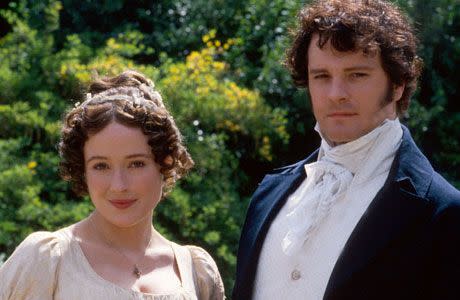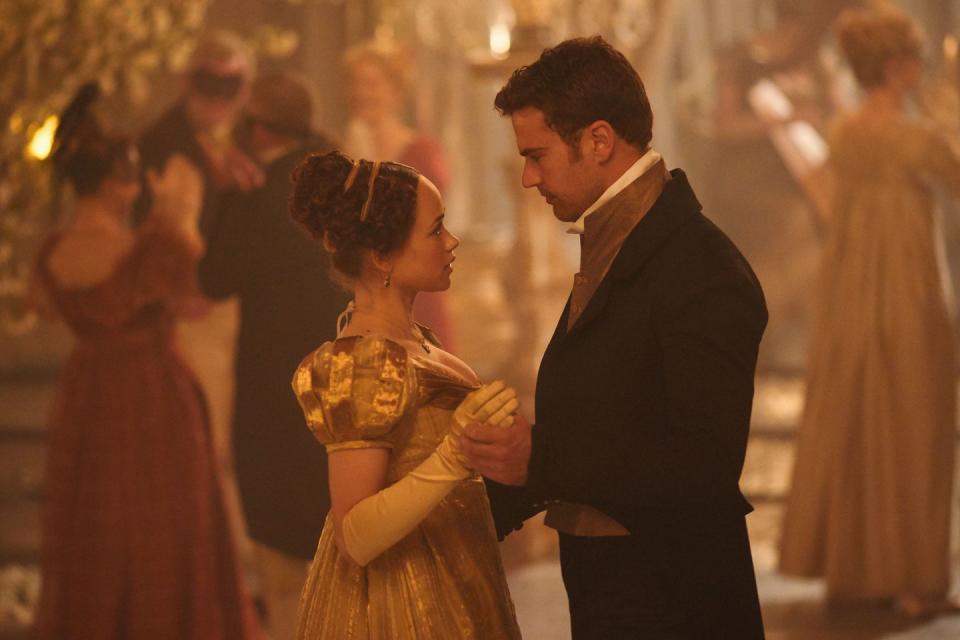Sanditon's Writer Reveals Why He Feels "A Bit Guilty" About the Show's Shocking Ending

Screenwriter Andrew Davies has become something of a cultural caretaker for Jane Austen's ouevre. At this point, he's adapted five of the Regency author's seven works for screens big and small, with his most recent project being a reimagining of Austen's final unfinished novel, Sanditon, which just finished airing in the States on Masterpiece PBS.
Faced with a daunting task, Davies set out not to predict the exact plot Austen herself would have written, but rather to take cues from her first few chapters, and to turn that story into compelling television for a 2020 audience.
Here, Davies reflects on the show's controversial ending, reveals what's in store for heroine Charlotte Heywood should Sanditon get picked up for a second season, and shares which of Austen's works he's reading right now.
Why do you think Jane Austen's stories have such enduring appeal?
I think they've got a basic fairy story construction, where a sweet young girl, who seems to have things going against her, gets all the rewards in the end that we think she deserves. That can be a very soppy and sentimental kind of story, but Jane Austen always manages to tell it with a high level of insight into subtleties of character, so you get all sorts of satisfaction from it.
I like them because I think they're intelligent, and they're funny, and they're very subtle, and very perceptive about human nature.
I tend to go back to a Jane Austen novel when I feel like I can't really remember the plot of it really well, so I re-read it. I'm re-reading Mansfield Park right now, which is probably my least favorite, for about the third or fourth time, and I'm enjoying it much more than I thought I was going to.
Why is Mansfield Park your least favorite?
I think because Austen set herself the most difficult problem in it. I mean, compared with Pride and Prejudice, Sense and Sensibility, or Emma, for example, who have clever, beautiful, witchy heroines, Fanny Price is shy, sickly, and dull. She's not particularly clever, but she is good, and that's almost all she has going for her.
So, Jane Austen tries to write a really captivating story, with a heroine who has none of the big advantages that her other heroines have. It's difficult to warm to Fanny, but I think in the end you do. It's a deeply satisfying read.

Let’s talk about Sanditon, which just finished airing here in the US. It was a much larger undertaking than some of your other adaptations because you actually completed the story.
It is. I'm not so much interpreting, as making up the story. I mean, she gives us pretty clear guidelines about what it's all about. It's about one of her lovely young heroines, and Charlotte's a very attractive one. There's no problem in getting people to like Charlotte. She's innocent, but she's forthright; she's got views of her own; she's quite a strong character; and she's willing to make mistakes and correct herself. So that's one aspect.
The other aspect, which is unusual, is this setting of a seaside town in the process of being created. The men, the Parkers, are different from the usual kind of Jane Austen men because they're not country gentlemen. They're entrepreneurs; they're businessmen, transforming the world they live in and trying to make themselves a fortune in the process.
It's different, and it's symptomatic, probably, because it was the last thing she wrote. I think by 1819, that was very much a feature of the time. The entrepreneur and the businessman were beginning to take precedence over the traditional country gentleman.
People have had strong responses to this show. How would you respond to critics who said that it's not Austen enough, or that it's too sexy?
I think Austen is very sexy. I mean, she tends not to put the sex up front and center, although sexual desire is one of the prime motivations in almost all her plots. That's what gets the story going. If you think about Darcy, for example, it's his desire for Elizabeth, which he disapproves of in himself because he doesn't think she's socially high enough for him. She's got everything going against her, but he just can't stop himself following her around like a dog.
I suppose in my adaptations and in Sandition, which is more of an original, I'm inclined to foreground the fact that these are young people, who are bursting with sexual hormones and to emphasize the physicality of it all. Hence the nude bathing scenes, and so on.
I think people were shocked by the nudity more because it was male nudity, and people aren't used to seeing that on screen. Was subverting that expectation intentional?
It is good to be able to reverse the expected situation. In fact, we could do it, while being absolutely true to the period, because at that time, when people went bathing, the men bathed completely naked, and the women wore an enormously elaborate unflattering contraption that concealed everything.
In terms of the #MeToo era, and the politics of nude scenes in 21st-century movies, it was fun to go the other way around. Fortunately, our men were all up for it, and a very fine looking body of men they were.

One of the things that I was most surprised by in the show was the pseudo-incestuous relationship between the Denhams. Tell me about that character choice.
It wasn't so much of a conscious choice. In a way, it just occurred in the writing of the scene, I think when Edward was brushing Esther's hair. And I thought, goodness, they're much closer than I thought they might be. It's one of those things where the characters start taking over a little bit. I thought, let's develop that. It was one of those osmotic kind of things that just happened, just crept up on you.
Is there any news about a potential season two?
No. We hope and we hope, but at the moment, it doesn't look hugely promising. I think everything depends on how warmly the American audience receives it. It's all up to you guys, really.

Another question that comes up a lot on social media: why did you choose to give Sanditon an unhappy ending?
Well, really because we were rather banking on having a second series. We certainly didn't want to leave Charlotte to be in despair for too long, that was the reason.
But one could also say that audiences, I think, are perhaps too used to having all their expectations fulfilled. I did feel sorry—a lot a lot of people were posting on Twitter in the UK, "How could you, how could you?"
"I've had just such a rotten year, and I was just counting on Charlotte and Sydney having a happy ending. Now, you leave us with this, Mr. Davis." I did feel a bit guilty.
But anyway, if we get a second series, we're certainly going to eventually give Charlotte an ending that she would like.
Do you have any plans to revisit any Austen's other works?
I've done four of the six. I suppose, five of the seven, if you count Sanditon. Mansfield Park and Persuasion are the only two that I haven't had a go at. I was partly re-reading Mansfield Park to see if I was interested in doing it again. If anybody wanted me to, I certainly would take a chance.
Sanditon is now streaming on the Masterpiece Prime Video Channel.
You Might Also Like

